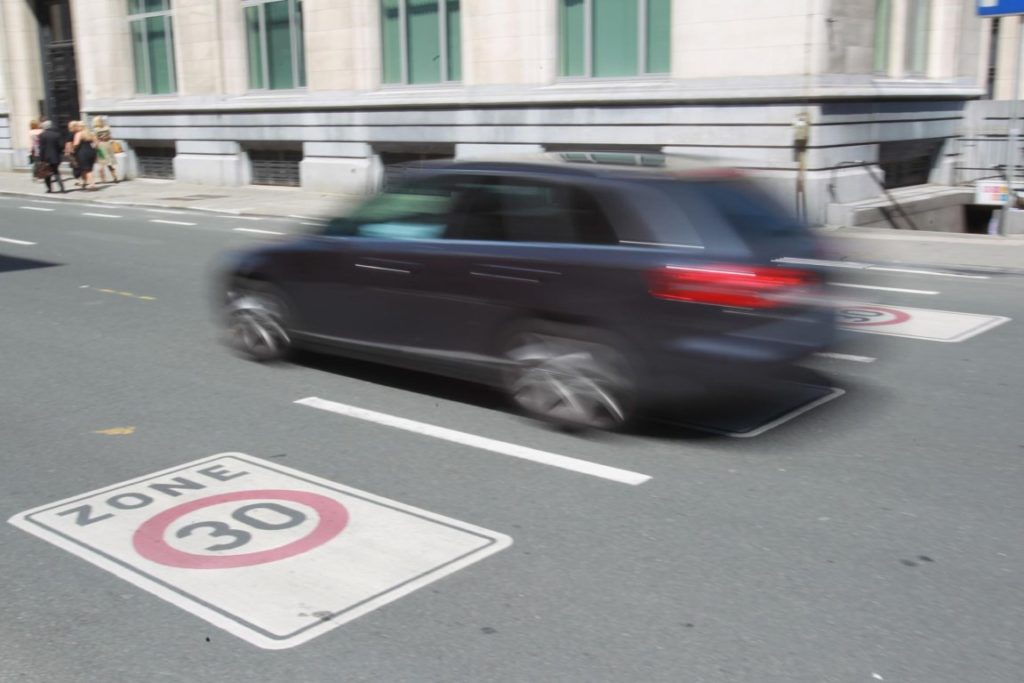The interim evaluation of the 'Zone 30' speed limit introduction in Brussels has shown that the number of accidents has been reduced by one-fifth.
On 1 January 2021, a general speed limit of 30 km/h was introduced across most of the capital, and eight months after it was launched across most of the city, compliance with the measure has been positive, according to an interim evaluation by Brussels Mobility.
"We are starting to see it: City 30 does work. Accidents at lower speeds take less of a toll. We know that, and we can see it in the figures. A little effort on the part of drivers means lives won and misery saved, day after day," said Minister for Mobility and Road Safety Elke Van den Brandt.
To take into account the lockdown period between March and May 2020 when evaluation the results, the figures for the first half of this year were compared to the average of the years 2016-2020, showing a 20% drop in the number of accidents in Brussels.
A larger decrease was recorded in the number of people who became seriously injured or died as a result of traffic accidents, as this figure went down by a fourth compared to the average of the previous four years, the lowest in five years, including during the lockdown periods.
When it comes to the average speed, a "visible and steady" decrease was measured on all roads during the mid-term review in the spring of 2021, whether the newly introduced speed was limited to 30 or 50 km/h, whilst average speeds seem to be stabilising at lower levels.
Meanwhile, the report showed that by lowering the speed limit from 50 to 30 km/h, traffic noise has been halved in some cases, depending on the type of road surface.
Related News
- Every day, 12 children are involved in an accident on their way to school
- Brussels looks to tackle noise pollution, following Ghent's example
- Use of polluting and toxic leaded petrol eradicated world-wide
"Noise is a major concern for the inhabitants of Brussels. It is mainly linked to road transport and has a major impact on our health," said Minister for the Environment Alain Maron.
"The studies carried out by Bruxelles Environnement on our roads over the past few months show that slowing down traffic is a key element in improving the quality of life of the inhabitants of our city and that 30 km/h is an important lever to achieve this," he added.
Right direction
Despite the progress made in the previous months, there is still a lot of work to be done, according to Van den Brandt.
"This is still an interim evaluation in an unusual period, and there will be many months and years of steep improvement to come, but the fall in the number of fatalities and serious injuries, in particular, shows that things are moving in the right direction," she said.
Making a correct comparison between this year and last remains difficult, but according to the report, the number of accidents did increase since 2020, whilst the level of traffic on the roads has not yet reached pre-Covid levels.
The report from Brussels Mobility stressed that, although the analysis of the injured per means of transport shows a decrease in the number of injured for all categories of road users, the situation remains precarious for cyclists.
However, "this should, of course, be seen in the context of the explosive growth in the number of new cyclists in Brussels over the past two years," the organisation stated.
Brussels Mobility has vowed to continue informing road users about the standard speed limit of 30 km/h and to monitor motorists, by, among other means, installing 12 new speed cameras in the Brussels-West and the South police zones.
A new federal public prosecutor's office has also been created, which will gradually lead to a drastic reduction in tolerance for speeding in the areas included in the City 30 scheme.
Meanwhile, other European capitals are looking at introducing maximum speed limits of 30 km/h, including in Paris, where the scheme was introduced across the city this week, excluding the Champs-Elysées and the Paris ring road, where the limit will remain 50 km/h and 70 km/h, respectively.

